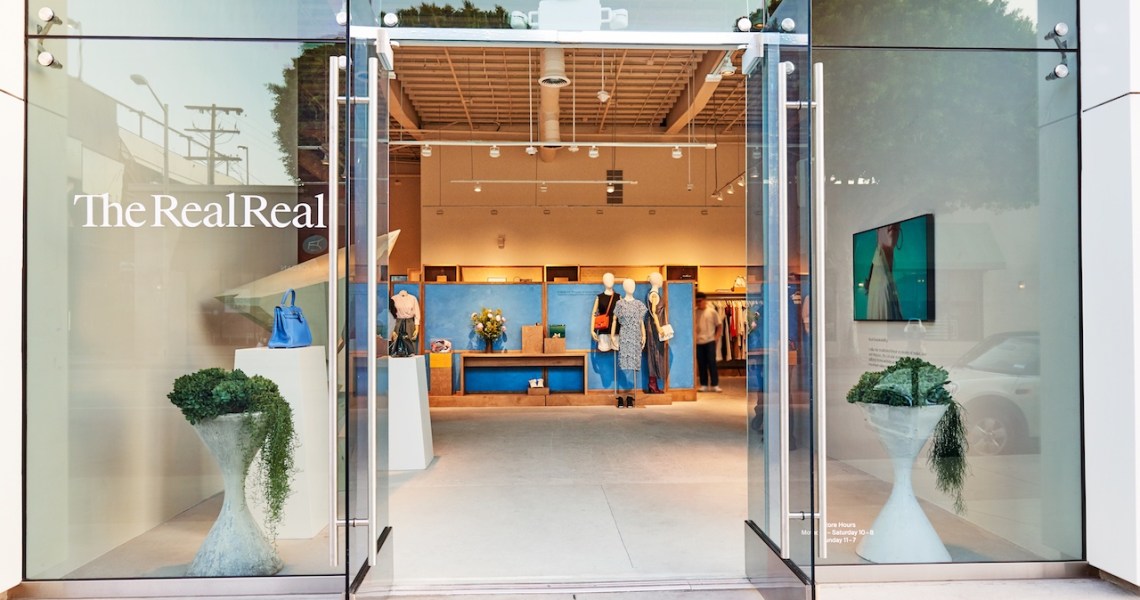This story was originally part of the 2023 Glossy 50 feature. Click here to see all of this year’s honorees.
When John Koryl joined luxury resale platform The RealReal as CEO in February, he hit the ground running. Eight months later, the company’s investor trust was restored.
In early November, The RealReal reported its third-quarter earnings for the period ending on September 30, revealing both revenue and profit that exceeded analysts’ expectations. Most notably, its adjusted EBITDA loss had dwindled to $7 million, compared to $28 million in the same quarter last year. Following the announcement, the company’s stock climbed 30%. Since going public in 2019, The RealReal has maintained a goal of reaching profitability by 2024.
“Until we showed our Q3 results, most of the analysts who covered our stock weren’t really convinced that we could be profitable in our core business,” said Koryl, “But we’ve turned it around and showed that this can be a profitable company. And I still stick by [the claim] that we’re going to be EBIDTA positive in 2024.”
A self-described “tech nerd,” Koryl formerly spent seven years at eBay building marketing technologies and leading growth in international markets. That was followed by seven years at Neiman Marcus, where he grew the e-commerce business from $700 million to $2.5 billion before taking on the in-store business, too.
Koryl credited The RealReal’s president and COO Rati Sahi Levesque and CFO Robert Julian for jump-starting the company’s path to profitability. The duo served as co-interim CEOs after founder Julie Wainwright stepped down from the role in July 2022. Valuable changes they made included updating the seller commission structure to discourage the consigning of low-value items, halting company buys of inventory directly from brands and refocusing on product categories the company sells best — namely, ready-to-wear, shoes, bags, jewelry and watches. Koryl moved fast to build on their progress, greenlighting a large investment in warehouse automation within the first month he was hired.
“I walked into the Perth Amboy warehouse in New Jersey, … and I was like, ‘1995 called, and they want their warehouse back,’” Koryl said. In the name of increasing operational efficiencies, polybag machines, auto-corrugated boxers and additional conveyance were implemented soon after. Koryl estimated that, as a result, the warehouse team has become 5-10% more efficient this year.
Ad position: web_incontent_pos1
Koryl’s additional means of streamlining the company’s systems included inserting AI and machine learning into the product intake process. Upon leveraging the company’s library of product photos, a seller’s history with the company and information about the abundance of a style’s fakes on the market, a product is assessed as low- to high-risk and is authenticated accordingly. For high-risk products — which include all styles by a handful of “marquee” brands, Koryl said — an AI camera tool called Vision is used to examine minuscule details of products. That could include the grain of a bag’s leather or the adhesive securing a style detail.
In addition, Koryl introduced new revenue streams for The RealReal. The first, inspired by sneaker resale companies, allows select partners, like luxury watch retailers, to consign products on The RealReal through a “virtual inventory” model — the brand or retailer keeps the products on their own shelves until sold. Koryl believes the segment could grow to make up 10-20% of the business. The second launch introduced advertising to The RealReal’s web and app experiences, granting outside companies access to the TRR’s 34 million members who view 3 billion web pages on the site per year. With support from media company Modern Luxury, The RealReal quickly evolved its ad business from centering on programmatic ads to offering direct buys. Its first direct advertiser recently signed on.
“We have a very enviable customer base. And with all that first-party data, there’s a lot of money that can be made,” Koryl said, adding, “Our best days of advertising are ahead of us.”
Along with the progression toward profitability, Koryl said his proudest achievements for the company this year include crossing the 40% threshold for brand awareness and improving customer satisfaction. The latter was thanks, in part, to the introduction of a “real service” team focused on ensuring consignor happiness. He was also sure to credit TRR employees’ agility and nimbleness as they adjusted to changes.
Moving forward, Koryl said maintaining slow growth of low double digits will be a focus. In addition, he said, The RealReal is in talks with three store locations which could open as soon as next year. And finally, the company may begin marketing its sustainability progress, assuming its growth trajectory remains.
Ad position: web_incontent_pos2
“It’s a bit disingenuous to talk about sustainability if you’re not profitable,” Koryl said. “But I can’t wait for the day when we show everybody that a resale business can be profitable. The sustainability story will have a lot more merit then, and it will be given a lot more amplification.”




